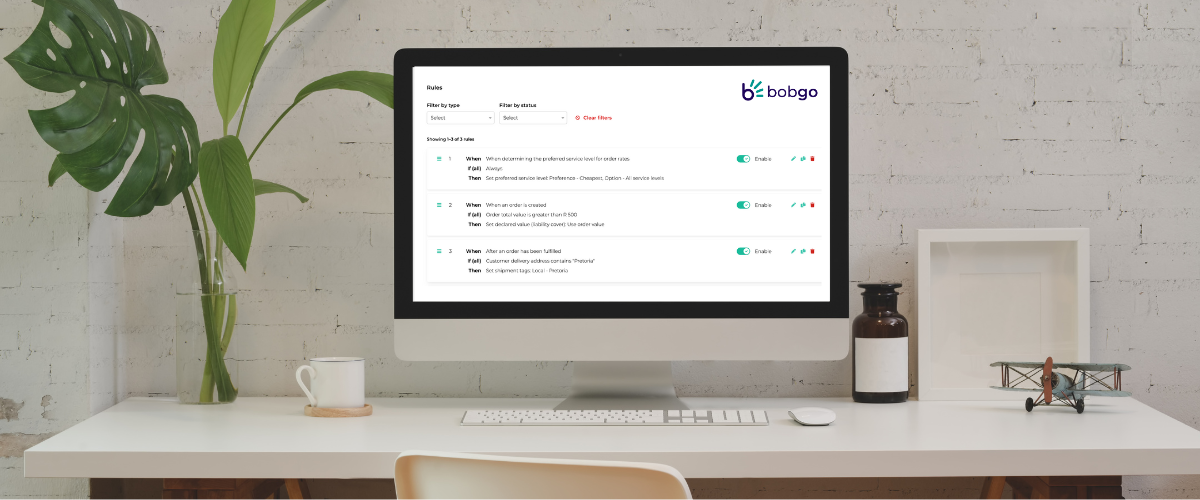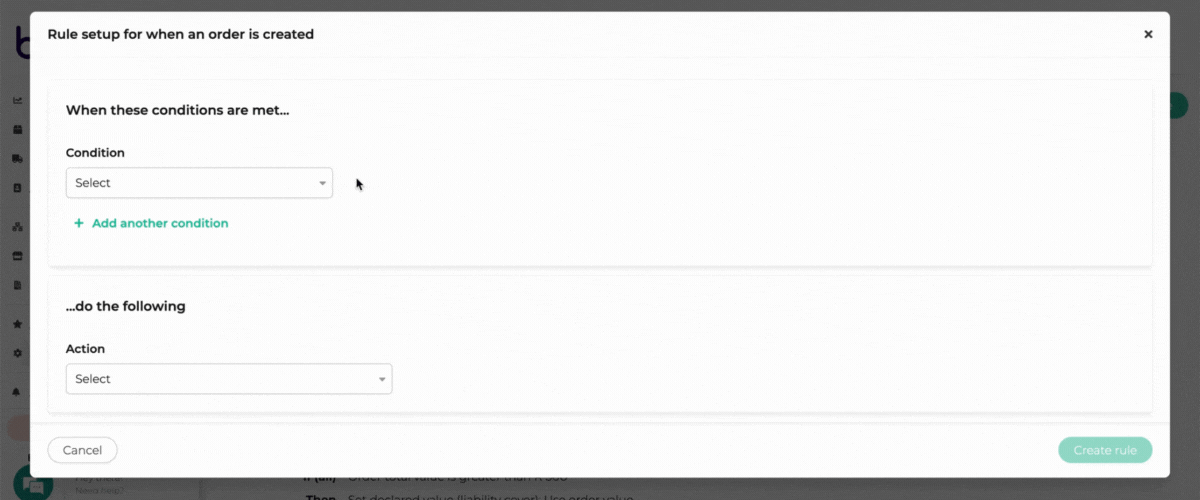Rule engine
Rule engine
The Bob Go rule engine is a powerful tool that enables users to streamline and automate their order processes. Rules perform automated actions on orders when certain conditions are met. Multiple conditions can be specified per rule, giving users better control over their fulfillment processes. A drag-and-drop feature is also available to save rule priority.
To set up, edit and manage rules, navigate to settings in the left navigation pane and select rule engine from the menu.

Rule types and triggers
Each rule type will trigger an automated action based on specific conditions. It is possible to configure multiple conditions per rule, and the user can choose whether all or just one condition (and/or) must be met for the action to be executed.
There are five types of rules* that can be configured:
- “When an order is created”
- “When determining the preferred service level for order rates”
- “After an order has been fulfilled”
- “When a rates at checkout request is received”
- “When determining pickup point rates for rates at checkout”
*Available rule types depend on your active subscription plan.
Conditions
- Always
- Received from channel
- Any order tag
- Order total weight
- Order total value
- Order total quantity
- Buyer selected shipping method
- Order status
- Order payment status
- Any order item name
- Any order item vendor
- Any order item SKU
- Any order item quantity
- Any order item unit price
- Any order item unit weight
- Any order item dimension
- Any order item length
- Any order item height
- Any order item width
- Order items stacked length
- Order items stacked height
- Order items stacked width
- Any WooCommerce product shipping class
- Any Shopify product location name
- Customer delivery address
- Customer name and surname
- Customer email
- Customer phone number
- Collection address postal code
- Delivery address postal code
Conditions are linked to a variety of attributes, including order tags, order weight, order value and so on. Multiple conditions can be configured per rule, and the user can select if all or one condition (and/or) should be met for the action to be performed. Conditions must be assigned a value in order to trigger a rule action.

Rule actions
This rule action will automatically apply a specified fulfilment method to an order that matches the set conditions. This includes creating a shipment, marking as buyer collection, or any other fulfilment methods that should be available.
EXAMPLE: All orders where the buyer selected shipping method is “Collection” should be marked as buyer collection.
This rule action will automatically assign a collection address to an order that matches the set conditions.
EXAMPLE: All orders with a delivery address in Gauteng should be fulfilled from a specific collection address in Johannesburg.
This rule action will automatically assign a predefined package to an order that matches the set conditions.
EXAMPLE: All orders with an order weight of more than 5kg must be fulfilled with a specific predefined package.
This rule action will automatically set a declared value to an order that matches the set conditions. This could be a specified fixed amount or the full order value.
EXAMPLE: All orders over the value of R2 500.00 should have a declared value of R1000.00.
This rule action will automatically add additional delivery instructions to an order that matches the set conditions.
EXAMPLE: All orders with “glass” in the item name should have “Fragile – handle with care” added to the delivery instructions.
This rule action will automatically add collection instructions to an order that matches the set conditions.
EXAMPLE: All orders with an order weight of 10kg should have “Collect from gate 2” added to the delivery instructions.
This rule action will automatically add an order status to an order that matches the set conditions.
EXAMPLE: All orders with “digital” in the item name should be marked as “Completed” as the order does not require shipping and thus does not need to be fulfilled.
This rule action will automatically add an order tag to an order that matches the set conditions.
EXAMPLE: All orders with “digital” in the item name should be marked with a “digital” tag.
This rule will ensure that all orders that match the set conditions will be automatically archived.
EXAMPLE: All point-of-sale (POS) orders will sync through to your Bob Go dashboard without a delivery address. Utilising the above rule, you can set a condition that if a customers delivery address is empty the order should be archived for a less cluttered dashboard.
This rule action will automatically set the preferred service level for an order that matches the set conditions.
EXAMPLE: All orders where the customer delivery address is located in Gauteng should be shipped with the cheapest express service level.
This rule action will add a shipment tag to a shipment.
EXAMPLE: All orders with “Pretoria” in the delivery address will be marked with a custom shipping tag of “Local – Pretoria”.
The following rule actions can be applied to the When a rates at checkout request is received rule:
This rule action will return no rates for rates at checkout requests that match the set conditions.
EXAMPLE: No rates will be returned for orders containing products that are not shippable, like digital downloads.
This rule action will return rates for specific service levels when rates at checkout requests are received that match the set conditions.
EXAMPLE: A free shipping option will be returned to customers at checkout if the order contains a product that matches a set shipping class for which free shipping should be provided.
This rule action will exclude rates for specific service levels when rates at checkout requests are received that match the set conditions.
EXAMPLE: If a cart contains a product from Vendor X, Express service level rates will not be returned as all orders containing items from Vendor X can be shipped on an Economy service level.
This rule action will set parcels for rates at checkout requests that match the set conditions.
EXAMPLE: If the stacked order’s dimensions surpass a certain length, height or weight, a specific predefined parcel will be set and used to determine the rate returned to your customer on checkout.
This rule action will set a specific collection address for rates at checkout requests that match the set conditions.
EXAMPLE: If a customer’s delivery address and the merchant’s collection address are both based in Cape Town, only local rates will be returned at checkout. This ensures that the rate used to fulfill on Bob Go will match the rate selected by the customer.
The following rule actions can be applied to the When determining pickup point rates for rates at checkout rule:
This rule action will return no rates for rates at checkout requests that match the set conditions.
EXAMPLE: Orders containing products that cannot be shipped to a locker due to size constraints, for example, will not return any pickup point rates at checkout.
This rule action will set parcels for rates at checkout requests that match the set conditions.
EXAMPLE: If the stacked order dimensions surpass a certain length, height or weight, a specific predefined parcel is set and used to determine the pickup point rates returned to customers at checkout. These predefined parcels can be configured based on the various locker sizes.
